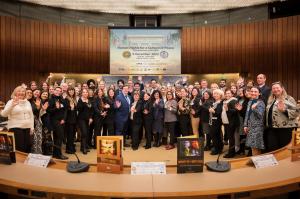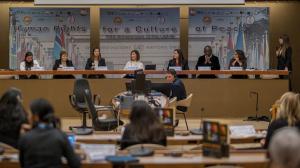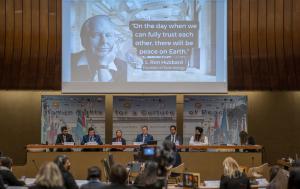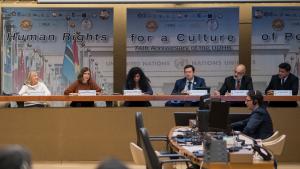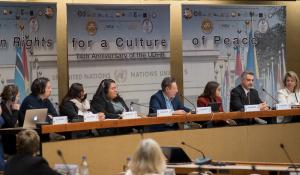Human Rights 74th Anniversary: “this extraordinary document, not a monument to human progress, to be admired from afar”
The NGOs "Diritti Umani e Tolleranza" and "Fundacion Mejora" held a full-day event to celebrate and discuss good practices to be strengthened.
GENEVA, SWITZERLAND, December 14, 2022 /EINPresswire.com/ -- Over 30 speakers from Civil Society, Government, supranational organizations, Academia and Faith Communities, gathered in Room XVIII of the United Nations in Geneva with the slogan #HumanRights4Peace , to explore good practices and things to improve to achieve implementation of Human Rights, through a culture of Peace, in an event organized by the two NGOs with Special Consultative Status to UN ECOSOC, "Diritti Umani e Tolleranza" and "Fundacion Mejora", two of the main NGOs in Europe that use the international educational program of United for Human Rights, strongly sponsored by Scientologists around the world.
As the 74th anniversary of the Universal Declaration of Human Rights (UDHR) ends and the 75th begins, we are confronted with a world divided into smaller and more militant factions and where the arts of dialogue and conversation are being lost to gun violence, fear, and hate.
At this moment in history marked by an ever-increasing lack of peace and understanding between human beings, when challenges of Human Rights keep arising day after day and where the arts of dialogue and conversation are being lost to gun violence, fear and hate, the United Nations UDHR remains one of the most important documents signed in the world's history, as well as the most universal and comprehensive reference in the realm of human rights. And despite being a key tool for peace and inclusion, it keeps being extremely unknown to the general population and even civil servants from member states, impeding in this way its logical application even in daily day life.
In its Preamble, the UDHR emphasizes that "recognition of the inherent dignity and of the equal and inalienable rights of all members of the human family is the foundation of freedom, justice and peace in the world."
So, where are we at on the implementation of Human Rights? What has been effective? How can Human Rights be even more instrumental in creating and widely spreading a culture of peace in every layer of society?
With a view to the future, the lectures explored good practices of States and Civil Society, separately and working together, that have resulted in improvements in the well-being and dignity of human beings.
The panels focused on 4 subjects concerning Human Rights implementation, namely: 1) Education, Freedom of Thought, Human Rights and Peace, Human Rights and Civil Society Activities. 2) Faith and Human Rights, 3) “Government, Article 18 - Universal Declaration of Human Rights and Peace” and 4) Human Rights and Civil Society Activities”.
The conference was inaugurated by the presidents of the 2 organizing organizations Ms Fiorella Cerchiara and Mr Ivan Arjona, together with Dr Kishan Manocha, Head of the Tolerance and Non-Discrimination Department at the OSCE Office for Democratic Institutions and Human Rights, and His Excellency Ambassador Irénéo Namboka VicePresident of AidO International, Human Rights adviser for the United Nations, former Human Rights Officer of The United Nations High Commissioner for Human Rights.
As Dr Manocha put it in the inaugural panel, the UDHR is “a document that calls us all to higher standards of being human and acting as human beings worthy of the name. For me, the Universal Declaration has never lost its magic. But this extraordinary document is not a monument to human progress, to be admired from afar, but is intended to be appropriated, to be owned by each generation as a blueprint, if you like, for taking concrete action to stand up for human rights and fundamental freedoms in our ongoing efforts to build a better world.”
The first panel covered the topic of “Educating the Youth on the Universal Declaration of Human Rights” as this promotes values, beliefs and attitudes that encourage all individuals to uphold their rights and those of others.
Preceded by a public service announcement on Article 29 of the UDHR (Responsibility) the speakers were Ms Fiorella Cerchiara, President of Associazione per i Diritti Umani e la Tolleranza; Ms Laura Guercio, Professor at the University of Perugia; Ms Valeria Antinoro, President of Associazione Sana Pianta; Ms Simona Castellucci, Attorney at law, Vice President of Associazione Sana Pianta; Mrs Georgina Martinez Herrera, PhD Constitutional Law & Human Rights; Mrs Lorena Tapia Núñez, Attorney at law and President of Fundación Latinoamericana Sostenible; Mr Joseph Sassou, President of (ACIDU), Association de la Conscience Illimitée pour le Devèloppement et pour l'Union and Ms Manuela Contucci, Founder of Spiritualità senza Frontiere.
The second panel focused on “Faith and Human Rights”. The Master of Ceremonies quoted Professor Lucas Swaine when he said “Freedom of thought is the precursor and progenitor of other liberties, including freedom of religion, freedom of speech, and freedom of expression. It is the indispensable condition of nearly every other form of freedom. With rare deviation, a pervasive recognition of this truth can be traced in our history, political and legal.
This rich panel was moderated by Rev. Eric Roux, a Global for Europe of the United Religions Initiative (URI), probably the largest interfaith network existing today. Among the speakers were Mr Wissam al-Saliby, World Evangelical Alliance’s (WEA) Director of the Human Rights Office in Geneva; Ms Thinlay Chukki, Representative of His Holiness the Dalai Lama, The Tibèt Bureau; Gursharan Singh, General Secretary Sikhi Sewa Society; Dr Lakshmi Vyas, PhD President of Hindu Forum of Europe; Mr Iván Arjona, President of the European Office of the Church of Scientology for Public Affairs & Human Rights; and Mr Boumediène Benyahia, Islamologist - Secretary General and scientific referent of the Coordination of Islamic Organisations in Switzerland (COIS), Director of the Institute of the Word (Kalima), Ambassador for Peace (UPF), Secretary General of the association CRI-Voice of Victims.
The third panel, “Government, Article 18 - Universal Declaration of Human Rights and Peace”, tackled how some governments in Europe tackle Freedom of Thought, Religion and Belief, mentioning some of the good practices that assist in getting closer to a sense of social peace and what other aspects have room for improvement in the globalized society of today.
Mr Arjona introduced the moderator of this panel, Dr Kishan Manocha, as someone who has lived the issue both from a civil society viewpoint and government or supranational organization in his role at the OSCE/ODIHR. Speakers were from Italy, Prof Maria d’Arienzo, who is a Full Professor of Ecclesiastical Law, Canon Law and Confessional Rights at the Department of Law of the University of Naples "Federico II" and a Member of the Italian Interministerial Commission for Agreements with Religious Denominations; Mr Pasha Shah, Officer of the Order of the British Empire, Assistant Director at Department for Levelling Up, Communities and Local Government from the United Kingdom; Ms Inés Mazarrasa, Director of the Foundation Pluralism and Coexistence (Living Together), attached to the Spain Ministry of Presidency, Parliamentary Relations and Democratic Memory; and finally Ms Isabel Ayuso Puente, Attorney at law, Secretary General of the Fundacion para la Mejora de la Vida, la Cultura y la Sociedad, and awardee of the 2015 Religious Freedom Awards.
The last panel of the day was “Human Rights and Civil Society Activities”. At the inaugural panel and during the previous panels, it has been seen as obvious that the job performed by civil society at large, is more than needed and the speeches of this last panel were pure testimony of it. The presenters were, Mr Massimo Restivo, Vice President of United Planet Foundation; Mrs Giulia Mazzoni, Attorney at Law - Member of the Scientific Committee of United Planet Foundation; Dr Alberto Zummo, Member of the Scientific Committee of United Planet Foundation; Mr Gianluca Piroli, Delegate of the Association Rock NO war; Ms Cristina Simonini, President of Associazione “Per i Bimbi”; Ms Jessica Avelar, President of Ammic - Asociación Mujeres Migrantes en Italia - Association of Migrant Women in Italy; Ms Marisol Chavez, Vice President President of Ammic; Ms Pascale Fressoz, President of the NGO Alliance Internationale pour les Objectifs de Développement Durable.
The Master of Ceremonies closed the event by saying that “the topic of Human Rights is vast, and we have just spent a crucial day together examining the state of the issue. We shared ideas, thoughts and plans, as well as concerns and hopes for the future. We took a look at the present and future activities, particularly those related to the elimination of different types of discrimination and human rights violations, manifested in all their forms. We shared a conceptual framework for a path to resilience that emerges from a collaboration between government and civil society.”
In conclusion, the different NGOs affirmed their dedication to increasing their joint actions and initiatives, to make individuals aware of their rights and responsibilities, so that we can faithfully trust each other. Because Peace could also mean trust, and as Humanitarian Freedom Fighter L Ron Hubbard put it: “On the day when we can fully trust each other, there will be peace on Earth.”
Scientology Europe
European Office for Public Affairs and Human Rights
+32 2 533 28 00
email us here
The Story of Human Rights
Legal Disclaimer:
EIN Presswire provides this news content "as is" without warranty of any kind. We do not accept any responsibility or liability for the accuracy, content, images, videos, licenses, completeness, legality, or reliability of the information contained in this article. If you have any complaints or copyright issues related to this article, kindly contact the author above.

